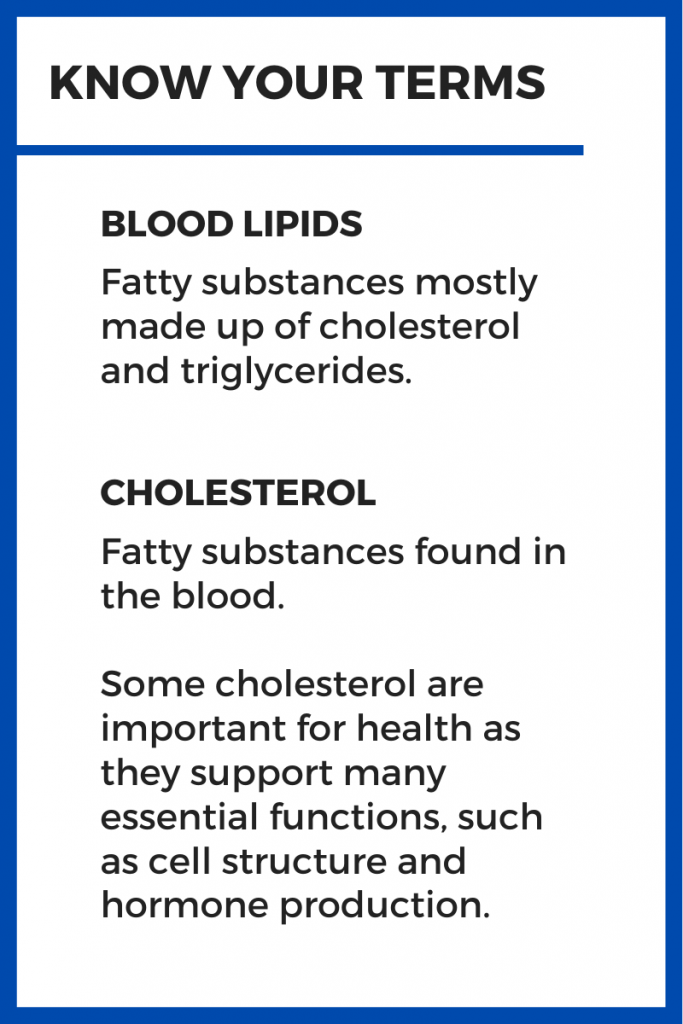Cardiovascular disease is the leading cause of death worldwide.
What does cardiovascular disease have to do with cholesterol and blood lipids? 
High cholesterol on its own does not cause symptoms. It can however significantly increase your risk of developing cardiovascular disease (CVD), including disease of blood vessels supplying the heart (coronary artery disease), brain (cerebrovascular disease), and limbs (peripheral vascular disease).
These conditions can, in turn, lead to chest pain, heart attacks, strokes, and other problems. Due to these risks, treatment is often recommended for people with hyperlipidemia (having too many lipids in your blood).
How do blood lipids cause cardiovascular diseases?
When your cholesterol levels are elevated, it can start accumulating in the arteries in a process called atherosclerosis.
Stay with me, let me break down the big words.
Atherosclerosis
The disease process begins when LDL (“bad” cholesterol) deposits cholesterol in the artery inner walls. It then gets oxidated and triggers inflammation. The immune system responds to the accumulation of cholesterol in the walls and inflammation by sending white blood cells (WBC). The WBCs accumulate in the wall together with the cholesterol, which can trigger other processes like calcification. If these are not stopped a plaque will form, narrowing the blood flow. The formation of the plaque in the wall of arteries is called atherosclerosis.
Thrombosis
Thrombosis is the ultimate complication atherosclerosis is associated with, caused by a plaque rupture. The rupture blocks smaller arteries nearby, preventing those areas from receiving oxygen and nutrients. On the site of the rupture, blood clots form which completely blocks the artery.
A heart attack or myocardial infarction is the result of this process causing a shortage of vital oxygen and nutrients essential to keep the heart muscle cells alive. If this happens in the brain, it is called a stroke. In any other part of your body, it’s a thrombosis.
Why is this a chronic condition?
Health promotion board defines a chronic disease as a medical condition that is generally progressive and can be managed with simple lifestyle changes. High blood cholesterol is one of them.
Take action today!
- Do a health screening and check your cholesterol levels
- Start a healthy lifestyle that includes:
- Following a heart-healthy diet
- Being physically active
- Maintaining a healthy weight
- Not smoking
- Cut alcohol intake
- Speak to a dietitian to help improve your lifestyle and reduce your risk of developing CVD.
At MyDoc we have several programmes that can help you gain control of your health. Contact us at support@my-doc.com to find out more.
The content in this publication is for educational purposes only, and therefore is not intended to be a substitute for professional medical advice, diagnosis or treatment.
REFERENCES
American Heart Association. (n.d.). Cholesterol and CAD. Retrieved from Watch, Learn and Live. American Heart Association’s Interactive Cardiovascular Library: https://watchlearnlive.heart.org/CVML_Mobile.php?moduleSelect=chlcad
Health Promotion Board. (3 Jun, 2019). Chronic Diseases: Understanding the Medical Conditions and their Causes. Retrieved from HealthHub: https://www.healthhub.sg/a-z/diseases-and-conditions/96/topics_chronic_diseases
Mayo Clinic. (2018, Apr 24). Arteriosclerosis / atherosclerosis. Retrieved from Mayo Clinic: https://www.mayoclinic.org/diseases-conditions/arteriosclerosis-atherosclerosis/symptoms-causes/syc-20350569
NHS. (2018, September 17). Cardiovascular Disease. Retrieved from NHS: https://www.nhs.uk/conditions/cardiovascular-disease/#:~:text=Home-,Cardiovascular%20disease,increased%20risk%20of%20blood%20clots.
Zmysłowski, A., & Szterk, A. (2017). Current knowledge on the mechanism of atherosclerosis and pro-atherosclerotic properties of oxysterols. Lipids in health and disease, 16(1), 188. https://doi.org/10.1186/s12944-017-0579-2
